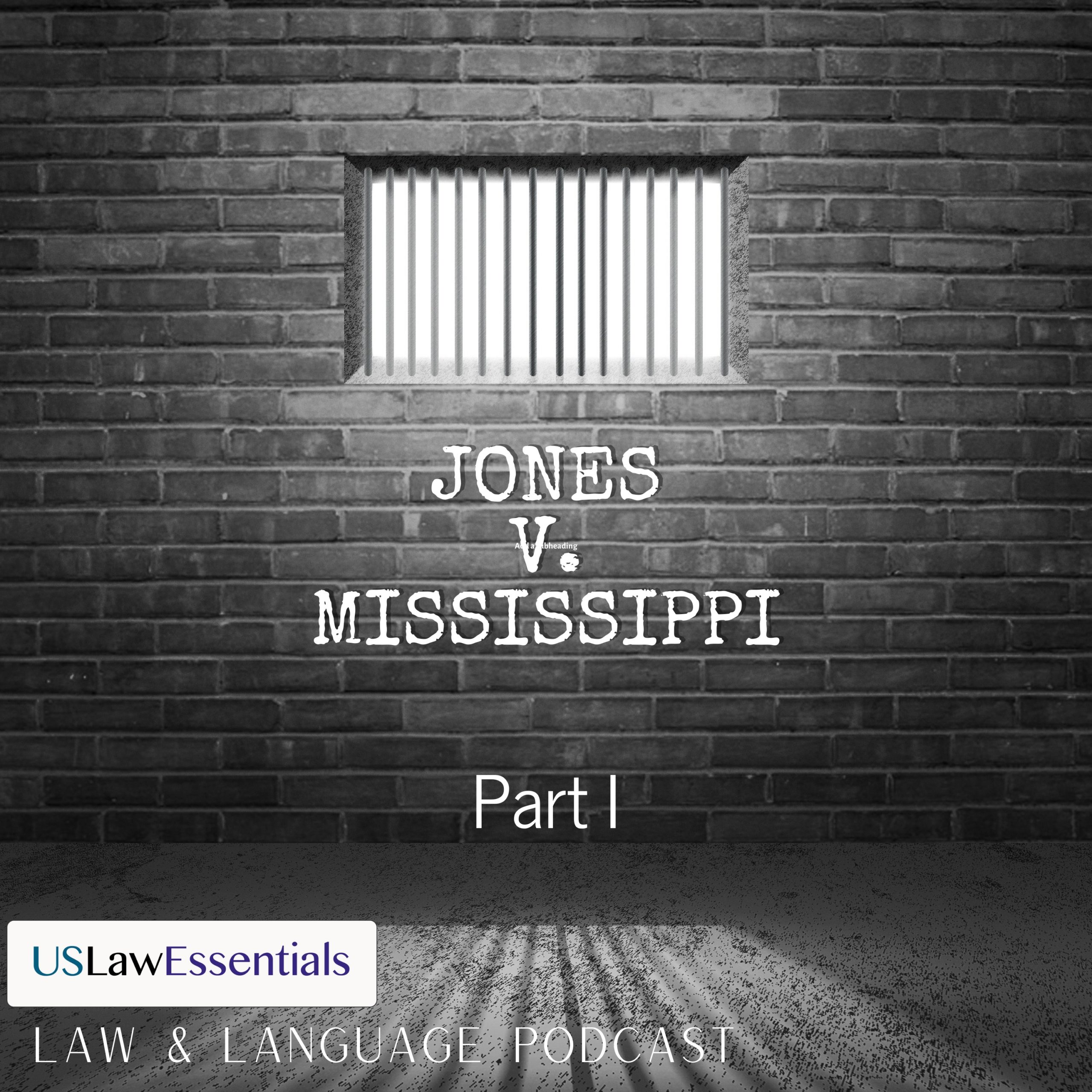Episode Transcript
Speaker 0 00:00:00 Welcome to the U S law essentials law and language podcast, the legal English podcast for non-native English speakers that helps you improve your English, listening, improve your legal English. Tabulary build your knowledge of American legal culture. Hi, and welcome to the U S law Central's law and language podcast on Daniel Edelson and I'm Steven Horowitz. And today's episode is part of our what's new in the legal new series, where one of us picks a legal news event to talk about
Speaker 1 00:00:36 Today is Dan's turn. So, Dan, what topic did you pick for us?
Speaker 0 00:00:41 Okay. What I have is a story about, and we have the link in the show notes and the title of the article is Minnesota man charged in securities fraud may have tried to seize Florida shell company records suggest which isn't a great headline, but
Speaker 1 00:01:00 Kind of a long headline, a lot to take in. But I guess that means there's a lot
Speaker 0 00:01:04 There. I think there is a lot there, and it's an interesting story because it's about a criminal and civil case. That's being brought by the government against a man who's charged with corporate hijacking in connection with a securities fraud scheme.
Speaker 1 00:01:25 And when you say the government, which government are you talking about?
Speaker 0 00:01:28 The United States government. And there is both a criminal case and also a civil case that's being brought by the securities and exchange commission also known as the sec.
Speaker 1 00:01:42 Oh yeah, the sec.
Speaker 0 00:01:44 So the sec is a government agency that's in charge of enforcing certain laws and regulations in connection with securities, or what would you call investments?
Speaker 1 00:02:02 So the sec is kind of like the government agency, that's responsible for making sure everybody feels like the stock markets and the bond markets are fair or reasonably fair so that people will continue to trust them and participate in
Speaker 0 00:02:20 That's exactly right. And the sec is able to bring a civil case when someone is accused of violating the securities laws. And this is an interesting story because this defendant is alleged to have committed something called corporate hijacking. Have you ever heard of corporate hijacking before? Uh,
Speaker 1 00:02:45 I've heard of hijacking. I mean, hijacking, you think of like somebody getting on a plane and then, and then taking control of the plane or telling the pilot, we're going to this other country and you take the plane and that's a hijacking the plane,
Speaker 0 00:03:01 But this is corporate hijacking. And it's kind of like identity theft where someone pretends to be someone else and then acts on their behalf, you know, and they could take money out of the person's bank account.
Speaker 2 00:03:15 So like,
Speaker 1 00:03:16 Like they're taking control of the company rather than of the, of an airplane
Speaker 0 00:03:21 Precisely. So the scheme works this way. The, the bad guy will find a company that's essentially defunct. It's no longer active. And
Speaker 1 00:03:36 Then somebody created a, a company. They filed something with the state government to say, Hey, I've created ABC company. And then it's just sitting there nothing's happening.
Speaker 0 00:03:47 Right. And that can happen for all sorts of reasons. Maybe the company just as an active, maybe it's essentially gone out of business. So now it says if you have a vehicle, but nobody's really paying that much attention to who's operating the vehicle. Then the defendant is alleged to misrepresent himself as being a director or senior officer of that company. So what this defendant is alleged to have done is he took a number of companies that were defunct, and then he filed papers to make it appear as though he were the director or officer of this defense company of this defunct company. But why would he do that? Right. It's a company that doesn't really do anything. So why would you want to be the director or officer of that company?
Speaker 1 00:04:51 So he's got his self as so now he's the CEO of this company that does, it's just a shell, it's a shell company. It's not doing that's precisely, right. If the CEO, which would seem to be right.
Speaker 0 00:05:05 So what is the point? Well, w w what he's alleged to have done is orchestrated a pump and dump scheme pump and dump pump, right? It definitely, but, but, but the crime is not for making a rhyme. The crime was for pumping up or inflating the price of the stock in this company, and then dumping then selling the stock for a profit.
Speaker 1 00:05:42 Oh yeah. So that's pump and dump is kind of a classic stock strategy where people will buy a stock that's cheap. And then they'll put all this information in the market and press releases or on discussion boards and get everybody all excited about it with information that's not true. And then once the stock goes up for a little bit, then they sell it all. Decisely
Speaker 0 00:06:05 Right. So this game works. This game works by first. The defendant represents himself as the officer or director of the company. So now all of a sudden he's able to make these public filings on behalf of the company. And he buys stock in this worthless company. So the company stock can be bought really cheap
Speaker 2 00:06:32 Just for a couple of cents. A couple of
Speaker 0 00:06:37 Exactly. In fact, you could call the, sometimes it's called penny stock. So he buys all this stock really cheap. And then as the officer or director of the company, he, he makes public filings with the securities and exchange commission in which he talks about these prospective business deals. And he even is alleged to have created these Twitter handles in which he essentially echoed this type of news all to create this impression that this defunct company suddenly has these great prospects.
Speaker 2 00:07:18 So,
Speaker 1 00:07:19 So there was a point in him making himself the CEO of the company and the director of the company, because then he, that gave him access to the S E CS system where he can, he can put information through that. And it comes at somehow comes out as a little bit more legitimate or trustworthy.
Speaker 0 00:07:40 Absolutely. So now it appears that this company has great news about its business prospects. This guy has already bought a lot of stocks, nice and cheaply. And according to the allegations in the complaint, when the stock price was inflated, he was able to sell it at a profit. But the accusation is that all of this news was simply false. There were no business prospects for the company. He was just simply trying to create this excitement in this market. So he could sell these stocks at a profit, thereby defrauding, the other investors.
Speaker 1 00:08:27 So, Dan, how has this, that, I mean, it seems like if you're, if you're getting a shell corporation through, you know, through funny means or through, uh, in a, in a funny way, that's a, that's a state law issue, right? That's a corporation. This is by state in the U S so how does this become a federal
Speaker 0 00:08:46 Case? A really good point. And it's an interesting way to look at the interplay between state and federal in the U S so corporations, corporations are formed under state law. So in certain cases, this guy had to essentially resurrect the company under state law. So he would file something with the local state authorities to get this company reinstated. However, securities laws in the United States are largely governed by federal law. So as soon as you start offering stocks on a public exchange, and as soon as you start making materially false representations in connection with securities, you're almost always going to be triggering some sort of federal law. Oh,
Speaker 1 00:09:46 Wow. And then, and then there's, there's a civil case and there's a criminal
Speaker 0 00:09:50 That's right. And that happens a lot in the U S where the underlying conduct can subject somebody to both a criminal enforcement action and a civil enforcement. And so the government can be essentially a plaintiff in the civil case, suing somebody for some type of fraud. And of course, after that happens, you could have people privately suing in connection with the same type of, in connection with the same underlying actions. So
Speaker 1 00:10:24 When, so when the sec is, is a filing the civil case, they're trying to get money back from this guy,
Speaker 0 00:10:30 Mark. Right. They can, one thing they can do is they can try to disgorge all of his unlawful profits. So disgorge. Yeah. That's a fun word to say. Cause like, when you grew wards, you, uh, you're overeating. Right?
Speaker 2 00:10:50 Right. So this is
Speaker 0 00:10:52 George and I love saying that word is where the government takes back all these unlawfully gain profits. So you gotta, you gotta give your money back.
Speaker 1 00:11:04 Yeah. It feels like there's something, when you disgorge something, there's like something big, that's stuck in something else, even bigger. And you have to like pry it out. Like you have to work really hard to get it out, and then you've got it. And it's no longer part. Right.
Speaker 0 00:11:18 I remember when I took the bar exam, there was a corporation's question. And I was so happy that I was able to write the word disgorge and I could just hear it echoing in my brain as I was writing it.
Speaker 1 00:11:31 Yeah. I think I was near you. Cause I heard somebody giggling and I
Speaker 0 00:11:35 Mess up your bar. No, I passed. It was, it was all good. Everything was over. I think that the sec can do is try to get injunctive relief,
Speaker 1 00:11:46 Injunctive relief. That sounds like a disease. Yeah. Maybe it's
Speaker 0 00:11:50 Something that you, that you get after you get scorched. But the dis the injunctive relief here would be an order from a court that would prohibit him from serving as a director or an officer for a public company
Speaker 1 00:12:10 Is, is an injunction. The same as injunctive relief are those synonyms and in an injunction that's different than a conjunction. A conjunction is like an but an or
Speaker 0 00:12:20 I suppose you're the grammar expert in an injunction. The government will either require you to do something or restrain you from doing something. So an injunction could be something like where, you know, your neighbors playing their music too loud. And so the government prohibits them from playing music too loud after a certain time of night.
Speaker 1 00:12:44 And I guess an injunction is what you get instead, like usually in a civil case, you want to get money, but sometimes money is not a good solution. So I guess injunctive relief is have to getting money. This is
Speaker 0 00:12:57 Something to keep in mind in us. Civil litigation is typically you aren't required to only request one form of relief. So there's no problem with asking for injunctive relief and also for compensation. So you could ask for money damages and also ask for some time, some type of injunction. And that's what the sec is doing here. They're asking the court to disgorge his unlawful gains and also asking the court to restrain him from engaging in similar activity or acting as a public officer or acting as an officer or director for a public company.
Speaker 1 00:13:36 Well, Dan, this has all been really interesting, but I'm getting a little worried that we might be hitting the legal limit for saying disgorge in a podcast. And I don't want us to run a foul of the sec or the FTC or the FEC or any of those E C E T agencies of the government that might, uh, that might monitor this podcast.
Speaker 0 00:14:03 Well, I understand, but we can always tell them that this is a discourse as podcast. I think I hear the sirens coming. Okay. Well thanks very much. Yeah.
Speaker 1 00:14:14 Thanks Dan. This, this is a really interesting and intriguing, uh, topic,
Speaker 0 00:14:18 And thank you very much for listening to the U S law essentials law and language podcast. Please check the show notes for links to the government's criminal action and also the SCCs civil action in connection with this case, of course, there's also a link to the article that we discussed. We hope that you enjoyed learning a little bit more about corporate hijacking and the circumstances underlying a securities fraud case. For example, you can practice explaining in your own words, what a pump and dump scheme means in English. We hope you enjoyed listening and that the show was helpful to improving your legal English. If there's other topics that you'd like us to discuss or people you'd like us to interview, please get in touch. There's contact forms on the U S law essentials podcast. Webpage, thank you again. And remember, stay essential.


